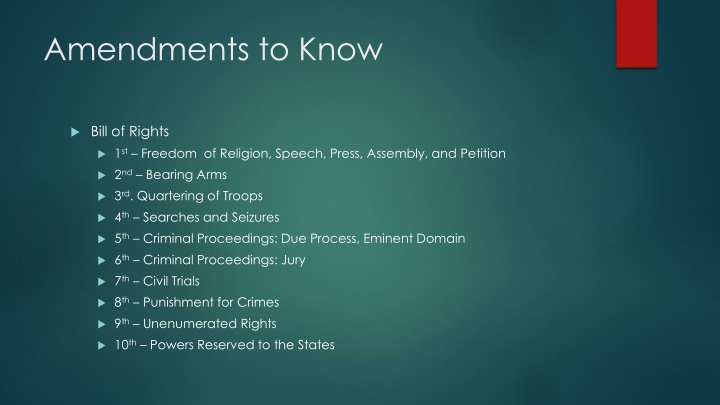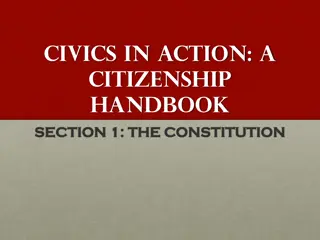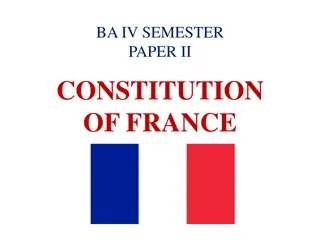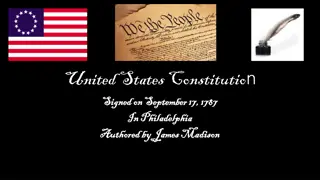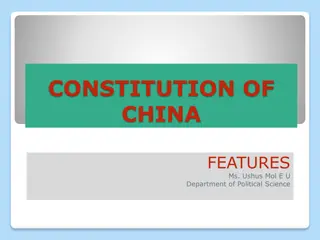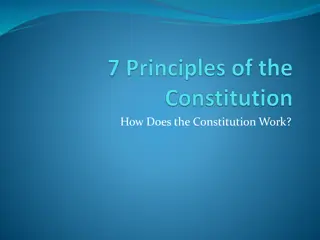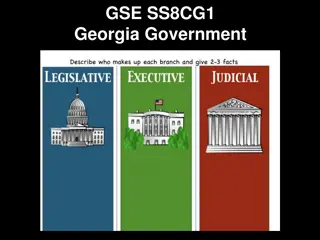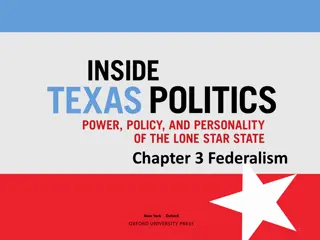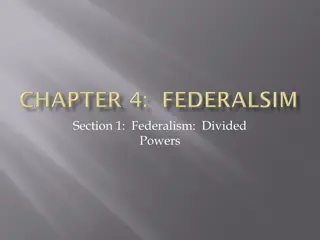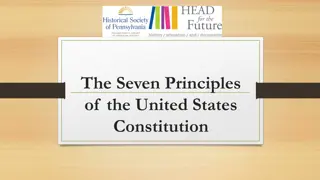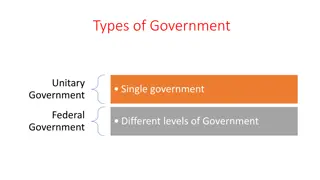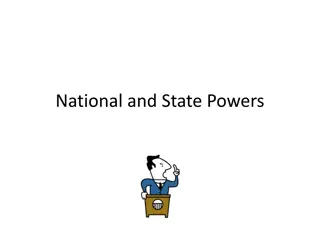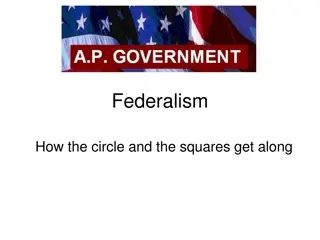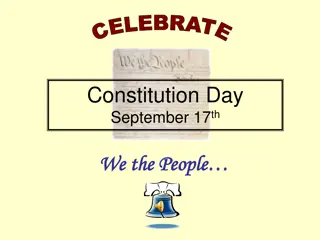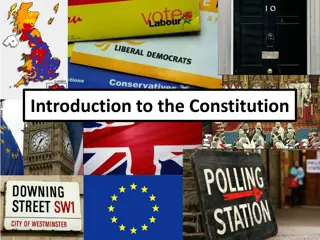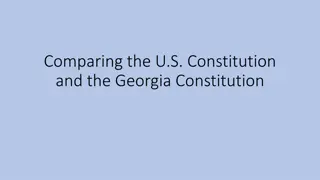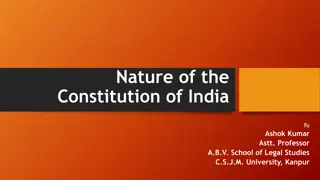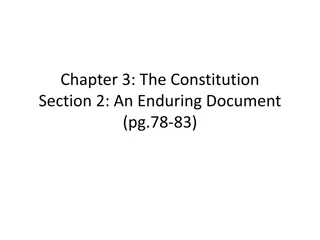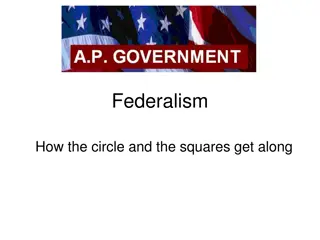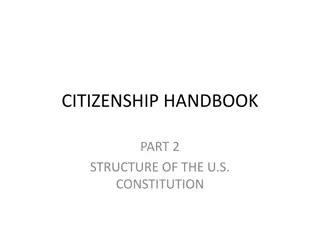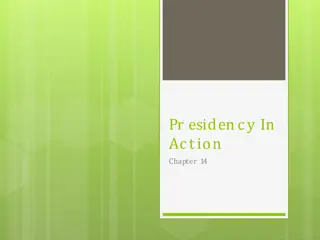Powers and Federalism in the Constitution
Learn about the various types of powers outlined in the Constitution and the concept of federalism. Discover the division of powers between the federal and state governments, including delegated, expressed, implied, inherent, reserved, concurrent, and exclusive powers. Understand the significance of the Bill of Rights amendments and how they protect individual freedoms.
Download Presentation

Please find below an Image/Link to download the presentation.
The content on the website is provided AS IS for your information and personal use only. It may not be sold, licensed, or shared on other websites without obtaining consent from the author.If you encounter any issues during the download, it is possible that the publisher has removed the file from their server.
You are allowed to download the files provided on this website for personal or commercial use, subject to the condition that they are used lawfully. All files are the property of their respective owners.
The content on the website is provided AS IS for your information and personal use only. It may not be sold, licensed, or shared on other websites without obtaining consent from the author.
E N D
Presentation Transcript
Amendments to Know Bill of Rights 1st Freedom of Religion, Speech, Press, Assembly, and Petition 2nd Bearing Arms 3rd. Quartering of Troops 4th Searches and Seizures 5th Criminal Proceedings: Due Process, Eminent Domain 6th Criminal Proceedings: Jury 7th Civil Trials 8th Punishment for Crimes 9th Unenumerated Rights 10th Powers Reserved to the States
Federalism DIVISION OF POWERS
Todays Objectives After this lesson, students will be able to Define each type of power Understand what powers reside with the federal government and state government by completing a Venn Diagram
Federalism in the Constitution This Constitution, and the Laws of the United States which shall be made in pursuance thereof; and all treaties made, or which shall be made, under the authority of the United States, shall be the supreme law of the land; and the judges in every state shall be bound thereby, anything in the constitution or laws of any state to the contrary notwithstanding.
Federalism in the Constitution The powers not delegated to the United States by the Constitution, nor prohibited by it to the States, are reserved to the States respectively, or to the people
Federalism in the Constitution The Citizens of each State shall be entitled to all Privileges and Immunities of Citizens in the several States.
Types of Powers Delegated Expressed Implied Inherent Reserved Concurrent Exclusive
Definition of Powers Delegated different powers given to the three branches of government in the Constitution Expressed those powers of Congress specifically listed in the Constitution Implied powers exercised by Congress which are not explicitly given by the Constitution but necessary and proper to execute the powers that are Inherent powers held by a sovereign state Reserved a political power reserved by a constitution to the exclusive jurisdiction of a specified political authority Concurrent powers in nations with a federal system of government that are shared by both the state and the national government Exclusive powers that can only be executed by a specific branch of government
Federalism Survey Complete the survey on your own Think about whether you think the power should belong to the national government or the state government Be prepared to explain why
Place the Powers on your Chart Collect Taxes Regulate Marriages Regulate Interstate Commerce Coin Money Charter Local Governments Lend and Borrow Money Registration and Voting Raise an Army Enforce Criminal Codes Regulate Professional Standards Declare War Administer Drivers Licenses Establish Courts Prohibit Racial Discrimination
Powers Denied to Nat l Gov t b/c of Fed. system Nat l Gov t Powers State Gov t Powers Tax normal state operations Declare War Charter Local Governments Regulate Interstate Commerce Grant pardons Establish min. age for marriage Collect taxes Coin money Set punishments for crimes Reserved Enforce Criminal Codes Charter Local Governments Registration and voting Regulate Professional Standards Administer Drivers Licenses EXEC JUD Build interstate highways, Power to levy duties on exports Establish courts Prohibit racial discrim. Establish rules for deportation Reg. Alcoholic beverage s Deny freedom of press Raise an Army Deny right to a jury trial Express Concurrent Powers Inherent Powers DENIED to Nat'l Govt expressly
State Powers (Reserved) Shared Powers (Concurrent) Federal Powers (Expressed or Enumerated, Implied) These come from the 10th Amendment Article I, Section 8 in the Constitution Regulate Marriage Enforce Criminal Codes Charter Local Governments Registration and Voting Drivers Licenses Regulate Professional Standards Collecting Taxes Lend and Borrow Money Establish Courts Regulate Interstate Commerce Coin Money Raise an Army Declare war =expressed Building dams = Necessary and Proper , or implied
